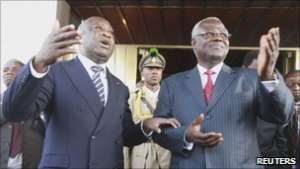
West African leaders have ended their mission to Ivory Coast, with incumbent Laurent Gbagbo refusing to stand down.
They told Mr Gbagbo he risks military action if he does not cede power to Allasane Ouattara, internationally recognised as the winner of elections.
The dispute has led to widespread unrest in Ivory Coast, with tens of thousands fleeing, more than 170 people killed and reports of torture.
State media has broadcast messages attacking those criticising Mr Gbagbo.
The TV station, controlled by supporters of Mr Gbagbo, indicated that the several million African nationals from neighbouring countries working in Ivory Coast might be at risk if the threats of military intervention continued.
Earlier, a United Nations peacekeeper was wounded in the arm with a machete when his convoy was attacked by a crowd in a Gbagbo stronghold.
'Reciprocity'
The presidents of Benin, Sierra Leone and Cape Verdi travelled to Ivorian capital Abidjan as representatives of the Ecowas West African regional grouping.
The visit was being seen as a final chance to urge Mr Gbagbo to peacefully cede to Mr Ouattara - who is currently holed up in a hotel in the capital protected by around 800 UN peacekeepers.
Few details of the separate talks with the two rivals have emerged, but President Boni Yayi of Benin told reporters: "Everything went well."
But in statements, it appeared that Mr Gbagbo was instead reinforcing his position.
One of his advisors told the BBC Mr Gbagbo was still the democratically elected president and that the Ecowas intervention was part of an "international plot" against him.
Mr Gbagbo's government has also said it will expel the diplomats of any country which stopped recognising the authority of envoys appointed by him.
"The government would like to make it known that, in the light of such decisions, it reserves the right to apply reciprocity in ending the missions of their ambassadors in Ivory Coast," it said in a statement.
Mr Gbagbo has accused the UN - which has some 9,500 peacekeepers in the country - of interfering in Ivorian affairs and has ordered it to leave.
The UN has refused to do so. It says at least 173 people have died in violence, and scores of others have been tortured, since the 28 November elections.
The violence broke out after Mr Ouattara's victory was overturned by the Constitutional Council, a body headed by an ally of Mr Gbagbo, citing claims that results were rigged in the north.
Almost 20,000 people - mostly women and children - have fled the Ivory Coast for neighbouring Liberia, fearing further unrest.
The UN refugee agency (UNHCR) says 15,120 people from villages in western Ivory Coast are known to have crossed the border and another 4,000 arrivals have been reported.
The West African presidents have left Ivory Coast and will now report back to Ecowas chairman Nigerian President Goodluck Jonathan, who, they said, will negotiate a date for their return to Abidjan.
The BBC's John James says the atmosphere in the city is tense, with everyone fearing a military intervention in the coming weeks.
Ivorians had hoped these elections would close the chapter on the country's most difficult 10 years, but instead they have opened up a new period of instability, he adds.




 Tuesday’s downpour destroys ceiling of Circuit Court '8' in Accra
Tuesday’s downpour destroys ceiling of Circuit Court '8' in Accra
 SOEs shouldn't compromise on ethical standards, accountability – Akufo-Addo
SOEs shouldn't compromise on ethical standards, accountability – Akufo-Addo
 Father of 2-year-old boy attacked by dog appeals for financial support
Father of 2-year-old boy attacked by dog appeals for financial support
 Jubilee House National Security Operative allegedly swindles businessman over sa...
Jubilee House National Security Operative allegedly swindles businessman over sa...
 Nobody can order dumsor timetable except Energy Minister – Osafo-Maafo
Nobody can order dumsor timetable except Energy Minister – Osafo-Maafo
 Mahama wishes National Chief Imam as he clock 105 years today
Mahama wishes National Chief Imam as he clock 105 years today
 J.B.Danquah Adu’s murder trial: Case adjourned to April 29
J.B.Danquah Adu’s murder trial: Case adjourned to April 29
 High Court issues arrest warrant for former MASLOC Boss
High Court issues arrest warrant for former MASLOC Boss
 Align academic curriculum with industry needs — Stanbic Bank Ghana CEO advocates
Align academic curriculum with industry needs — Stanbic Bank Ghana CEO advocates
 Election 2024: We'll declare the results and let Ghanaians know we've won - Manh...
Election 2024: We'll declare the results and let Ghanaians know we've won - Manh...
